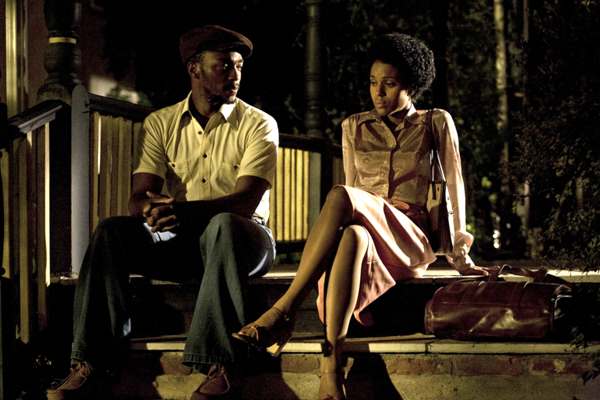|
Reviews of Recent Independent, Foreign, & Documentary Films in Theaters and DVD/Home Video

NIGHT CATCHES US The time is 1976, the place, Philadelphia, where the ghosts of the Black Panthers roam the streets and share the homes of the city’s finest and not so fine. No one’s immune from the spirits, no matter what their age or how far they attempt to run. Jamaican-born writer and director Tanya Hamilton takes on an ambitious subject for her first feature film. Her election to resurrect what has often been swept under the rug, the black power movement of the 1960s, is interesting in terms of encapsulating and linking a specific historical context to contemporary global warfare. Hamilton manages this cleverly and simply through the eyes of a child in a rundown neighborhood of the city. This writer’s technique, used so successfully in the past by Harper Lee (To Kill a Mockingbird) and her real-life friend Truman Capote (“A Christmas Memory”), never ceases to strike a universal chord of love and protection in even the most hardened among us. And so it is that a young girl of almost 10, Iris Wilson (Jamara Griffin), discovers a photograph among her mother’s hidden belongings of her dead father, a militant version of her mother—Patricia (Kerry Washington), now a night court attorney—and a stranger she recognizes seeing on the street earlier that day. After pressing her mother for information, Iris learns that her parents were members of the radical Black Panther Party for Self-Defense, her father killed a cop, and that he was imprisoned. She also discovers that the outsider from the street was her father’s best friend, Marcus Washington (Anthony Mackie of the The Hurt Locker), and that Marcus and Patricia share an ambiguous past of their own. As Hamilton’s story slowly unfolds and more and more is revealed, it continues to retreat into the past, leaving the viewer to wonder whether the film’s narrative is as linear as it appears or a lyrical lapse into avant-garde cinema. The fact that no one in the film is who they seem, and that Marcus, who appears so elegant and lofty, is angrily called a “snitch” by his former Black Panther comrades only causes Iris to dig deeper and deeper, at the risk of all their lives. The historical context of Tanya Hamilton’s movie, the Black Panther Party and its founding members, are almost as mysterious as the fictional characters representing them. The revolutionary movement began in Oakland, CA, under the direction of Huey Newton and Bobbie Seale in 1966. A brilliant pre-law student with the face of a Hollywood movie star, Newton was simultaneously a gentle and charismatic idealist, and a corrupt, and a highly combustible, fanatic. He believed at the time that black men could successfully break through the barricades that impeded them by their wit and with their guns. Newton advocated both formal education and low-down street fighting, and for many years his band of combatants were considered a security risk of the highest order throughout the United States. In Night Catches Us, the fervor of Newton’s legendary movement, now camouflaged in history, is rejuvenated by a half-cocked teenager named Jimmy Dixon, played by the very believable Amari Cheatom. And much like Newton himself, his fast moving incendiary violence soon dissipates and dies. Perhaps what makes Hamilton’s film as potent and unforgettable as the ghosts that rule the present are the questions it raises. Were the murders and anarchy practiced by the Black Panthers necessary to promote an equitable coexistence of all races in this country and beyond? (Understandably, peaceful relations with law authorities were not tantamount to the Panther’s creed at the time.) Surely that is the goal of contemporary societies. Furthermore, is bloodshed an essential evil when extreme changes are needed and all civilized methods have been exhausted? Naturally,
Hamilton does not offer any answers—just a false sense of security in a
civilized social order that only time will prove worthy.
Amy R. Handler
|

